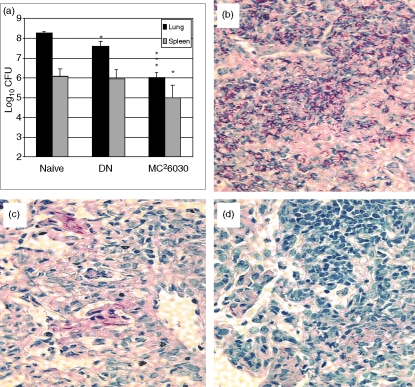Figure 6.
Adoptive transfer of immune CD4– CD8– Thy-1.2+ cells protected CD4–/– mice against an aerogenic tuberculous challenge. Two months after immunizing 20 CD4–/– mice with mc26030 (mc2), the mice were treated with anti-CD8 (clone 2.43), anti-TCR-γδ (GL3) and anti-NK1.1 (PK 136) mAbs twice before harvesting the spleens. The spleens were removed and the B cells were depleted from the spleen cells by adding anti-B220 microbeads and then passing the cells through a depletion column. Thy-1.2+ cells were positively selected by adding anti-Thy-1.2+ microbeads to the cells and then passing the cells through a separation column. Flow cytometry used fluorochrome-conjugated anti-CD8 (clone 53-6.7), anti-Thy-1.2 (53-2.1), anti-TCR-γδ (GL3), anti-TCR-β (H57-597), anti-B220 (RA3-6B2) and anti-NK1.1 (PK 136) mAbs; 4 × 106 cells were adoptively transferred into CD4–/– mice by intravenous injection, and 1 hr later these and the naive and mc26030-vaccinated control mice were challenged with 200 CFU of M. tuberculosis Erdman. One month later, the organ bacterial burden and lung pathology were evaluated.(a) CFU were reduced in the lungs of mice receiving DN T cells and mc26030-vaccinated CD4–/– mice relative to naive controls (*P < 0·05; **P < 0·01; ***P < 0·001). Post-challenge lung pathology for naive (b), adoptively transferred(c), and mc26030-vaccinated(d) CD4–/– mice is shown.

